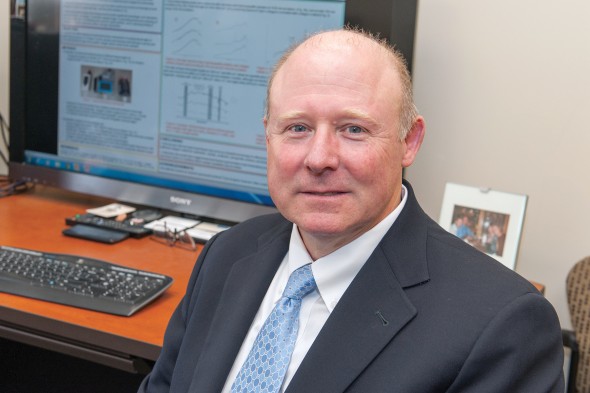Pain and suffering of toothache in the Dark Ages of dentistry

College of Dentistry professor Michael Colvard studies dental pain remedies since the beginning of written history. Photo: Roberta Dupuis-Devlin
One of the maladies that made the Dark Ages a few shades more shadowy was toothache.
“Patients often only had local plants and fermented plant products, i.e. beer and wine, when seeking pain relief,” says Michael Colvard.
A professor in the College of Dentistry and a practicing dentist, he recently earned a Ph.D., researching the dental pain remedies of yesteryear. “I study the medical anthropology of plants used in dental care since the time of written history, about 3000 B.C.,” he said.
His doctoral research focused on the plant medicine applications of the Knights Hospitallers, a Roman Catholic military order that cared for sick or injured pilgrims in the Holy Land during the Crusades of the Middle Ages. “They encountered Arabic physicians who taught them about opium and other plants, many of which the Knights brought back to Europe to grow,” Colvard said. “With the introduction of Arabic medicine and scientific thought, many scholars assert that the Knights helped to advance the Enlightenment.”
This included the growing of medical gardens in private homes and monasteries to supply the necessary plants. Toothache sufferers could seek relief by drinking an opium syrup, smoking henbane, smoking marijuana or drinking an oil from the plant, smoking tobacco for the nicotine and chewing coca or taking it in liquid form.
Colvard said these are still used as toothache remedies today. Even henbane, little known in this country, is cultivated in England and parts of Europe for this purpose. He noted that opium breaks down to morphine and codeine, and that lidocaine and novocaine are coca derivatives.
Colvard earned his Ph.D. in theology and medical anthropology through the Graduate Theological Foundation and its parent, Oxford Foundation House, at the University of Oxford in Oxford, United Kingdom.
Theology and dentistry may seem like an odd pairing until you hear Colvard’s explanation. “Chinese medicine is integrated into Buddhism, Ayurvedic medicine into Hinduism, Islamic medicine into Islam,” he said. “In the West you don’t have this connection to spirituality. Western medicine evolved as fractured from the church. And modern medicine has increased this distance from spirituality — some say it’s absent or divorced.”
Patients can be repaired without being healed, and vice versa, he said. “You can have cancer, and understand you are dying, that there are no treatment options, and yet be at peace and accepting of the situation.
“Other people are fully surgically and medically repaired, but suffer from haunting anxiety, like posttraumatic stress disorder — and even more troubling, a new condition known as moral injury disorder, needing an integrated healing based on both meeting one’s spiritual tradition needs and using science-based medicine.”
On a post-Ph.D. fellowship from the Oxford Foundation, Colvard will continue his research on plant-based painkillers this fall when he does spectrographic analysis of plants in Kew Gardens, outside of London, and at Oxford University.
“Shooting a laser beam at a plant, its reflection will tell us what chemical is in there and if it has a potential for pain relief,” he said. “It can be something we already know of for pain relief, or it could be a new chemical that could give pain relief.
“I hope to find new pain medications for dentistry that are safe and nonaddictive.”
For the last 25 years, Colvard has maintained a private practice in Schaumburg as a periodontal surgeon and oral medicine specialist. He began teaching part time at UIC in 1997, going full time in 2002 and cutting down on his private practice.
He is the director of the Dental Medicine Responder and Technology Office of the College of Dentistry. “I’ve helped build and define the role of dentists supporting disaster response,” he said.
Dentists help identify the dead with dental records and by scanning faces and comparing them to photos, such as those found on drivers’ licenses. They’re also on medical teams that give immunization shots during pandemic events, such as a flu outbreak.
Colvard grew up in the Western United States, mostly Colorado, the son of a military father who moved his family around a lot.
He earned his dentistry degree and certificate in periodontics from the Loyola University School of Dentistry. Albert Dahlberg, known as the dean of dental anthropology, taught the subject to freshmen at Loyola, “and I was hooked,” Colvard said.
He received a master’s degree in theological studies and medical anthropology from Seabury-Western Theological Seminary and a master’s in oral sciences from UIC.
Colvard lives in Cary with his wife, Kathleen, a retired nurse who graduated from UIC and worked at the UI Hospital, Loyola Medical Center and in her husband’s practice.
They have two sons. Christopher, 30, of Los Angeles, is a film animator whose jobs include the “Iron Man” movies, “Avengers: Age of Ultron,” “Guardians of the Galaxy” and his latest, “Ant-Man.” Jon, 28, a former Marine who lives in the Chicago area, is getting a master’s degree in computer cyber security through the American Military University.
Colvard is a former private pilot. He enjoys fishing in Colorado and at the Three Oaks Recreation Area in Crystal Lake.
